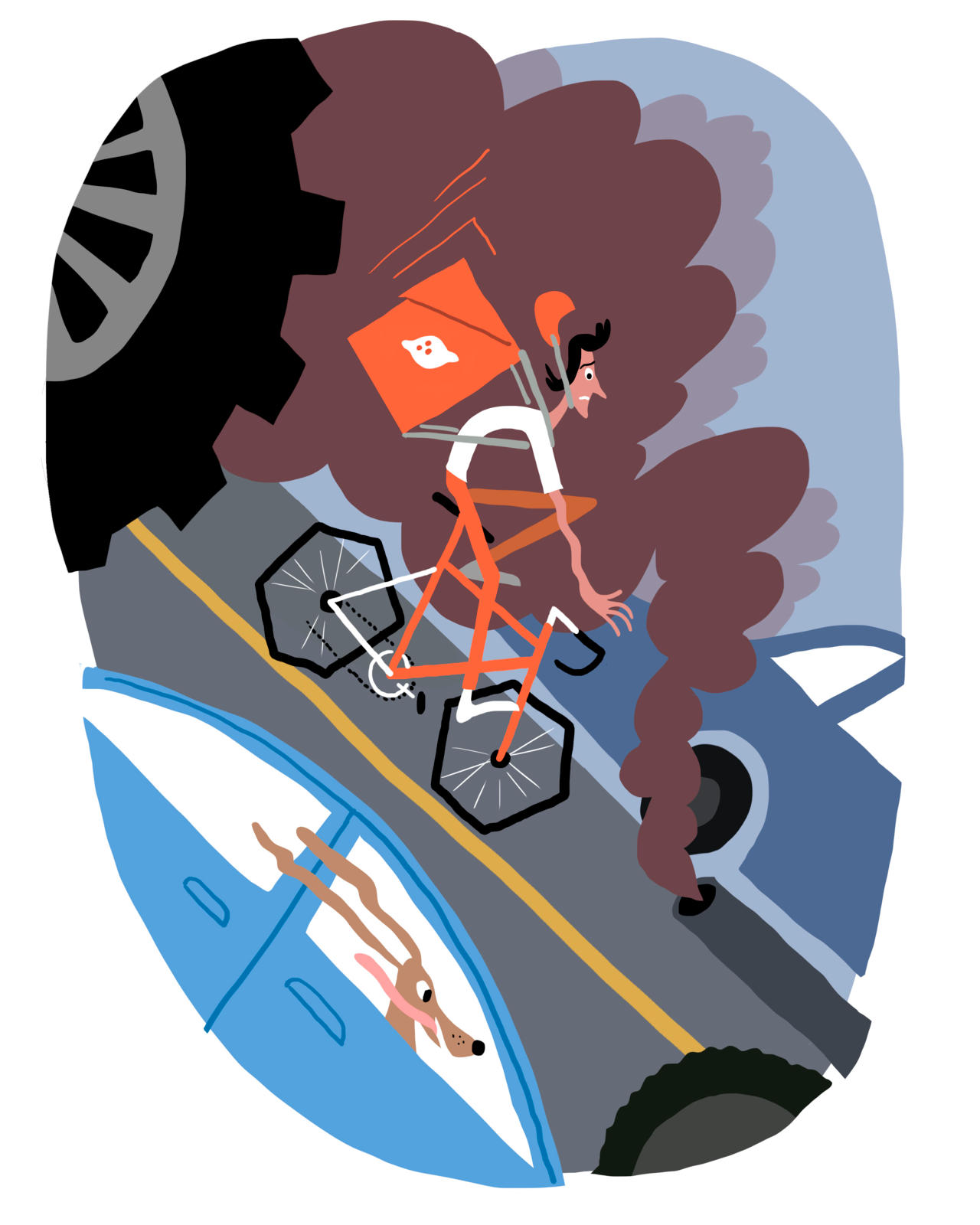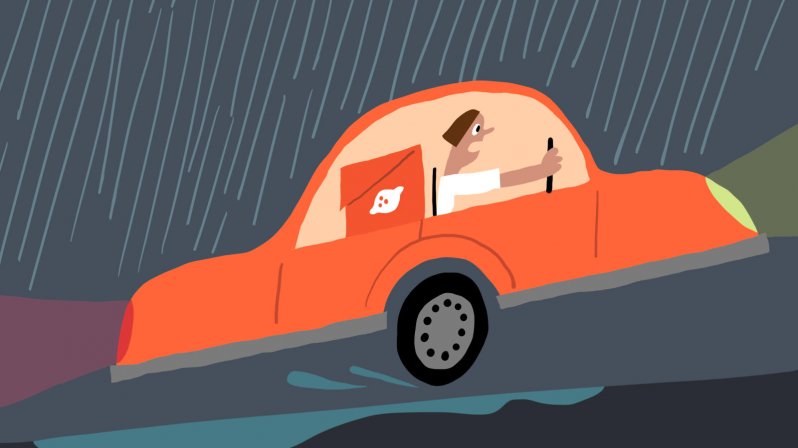Food couriers zoom through traffic with no protection
Delivery partner, freelancer, rider captain. The job titles of food couriers evoke a carefree, urban lifestyle. However, if an accident, unemployment or employer exploitation occurs, the couriers have no protection.
Couriers bearing the logos of food delivery services have started popping up on the streets of Finnish cities during the past few years. The companies represent new forms of business generated by the platform economy, a phenomenon which is beginning to gain more ground in Finland.
The flexible hours and commitment-free gigs make the work attractive with its occasional, optional shifts. The companies employing food couriers often market courier work as a fun hobby, or a way of life where the workers are free to themselves make the decisions on their work.
In reality, for many couriers the work is not a hobby or a form of exercise, it is their livelihood: a job that often requires a car and that is the lifeline for their personal or family's finances. Courier gigs may be the only source of income, particularly for workers with an immigrant background.
The freedom to choose is often limited to deciding whether to accept a courier gig or not, as the practicalities, price, uniform and location of the work are typically strictly regulated in advance.
According to Suvi Vilches, PAM legal counsel, the platform economy seeks to reorganise work. In the traditional model, a company produces goods or services for a client and employs workers on employment contracts for this purpose. In the new model, however, digital platforms relay individual gigs to "freelancers", who are, in theory, free to work whenever they want, and to piece together their livelihoods from several platforms if they so choose.
”Often these companies use language emphasising that the work does not constitute a job. For example, they may use words such as 'gigs' or 'rides', hoping to obscure the nature of the work they are commissioning."
"In general, the flexibility of the work is a highly relative concept in these companies. For example, the work of food couriers is controlled and managed in many ways. This means that they are not completing their duties independently, with the freedom of entrepreneurs, but under conditions that are equivalent to contractual employment," Vilches explains.
The most common reason for recruiting employees without formal contracts seems to be financial gain.
"These platform companies seek to avoid their statutory employer duties regarding the employees' social security. To do this, they intentionally try to obscure the limits of legislation and use new terminology to refer to the people working for them, while marketing flexibility as a benefit of their freelancer contracts. Similar flexibility could equally be provided by a zero-hour contract, which would offer an entirely different level of employee protection," says Vilches.
Speed is rewarded in the race for shifts
In Finland, food couriers are employed by the German-owned Foodora and the Finnish Wolt, both of which primarily offer work on freelancer contracts. Thus far this has been a marginal phenomenon, which means that there is no precise research data on the number of people working as couriers. According to estimates from Statistics Finland, in 2017, approximately 0.3% of Finns aged between 15 and 74 acquired at least a quarter of their earnings via digital platforms during the preceding 12 months.

Food courier work, like most other work available through digital platforms, requires that the workers own their tools and are responsible for their maintenance as well as any associated costs. If the tool breaks, the worker may be left without weeks or months of income, as the responsibility for repairs has been outsourced to the couriers themselves.
The gigs are determined by the company's app, which tracks the couriers and collects statistical data such as the courier's speed of fulfilling orders. Their ranking in the statistics then determines how many and what kinds of gigs they will be offered in the future.
There's no time to chat with the customers, as every courier effectively has a timer in their pocket with the app measuring each minute spent on the delivery. There are no break rooms or spaces for staying warm in case of bad weather, or the existing rooms are unsuitable for the purpose.
"I find the current system used by these companies worrying in terms of safety, as the couriers are competing both against the clock and one another. This puts them in an unfair position in which they have to strive for superhuman delivery times just to secure their livelihood, potentially jeopardising their personal safety in the process," Vilches points out.
What if you fall ill? Sick days may be a luxury a self-employed courier cannot afford.
"Our current social security system is largely based on contractual employment and the related earnings. If a courier who has been excluded from employer protection falls ill or is injured in the course of work, they are in an impossible situation: not eligible for pay from their period of illness, nor automatically entitled to compensation and rehabilitation covered by insurance like a formal employee would be," says Vilches.
Campaigning for courier rights
Faced with a situation where job insecurity, time pressures, unexpected costs caused by breakages in the courier vehicles and lack of social and break facilities are a normal part of work, the couriers have themselves started a campaign to improve their work conditions. There are ongoing campaigns in several countries in Europe and beyond.
In Finland, a group of current and former Foodora couriers launched a campaign in June. Before this, couriers working for Foodora and Wolt received a notification through the apps that their fees per delivery were to be permanently cut.
In addition to a revocation of this cut in fees, the couriers are demanding compensation for tool and vehicle maintenance, social facilities, sick leave, transparency in the allocation of shifts as well as the option to conclude an employment contract. Wolt couriers joined the campaign in November.
According to Vilches, it is likely that while the platform economy grows, it will start to face an increasing amount of opposition in the form of local and global campaigns.
"The platform economy will indubitably continue to gain ground, which is why it is more important than ever to improve the position of the people working through digital platforms. Working through an app is work, not a hobby or small-scale, voluntary gigging. This is why legislation must be developed to meet these new challenges," says Vilches.
"PAM is more than ready to discuss cooperation opportunities with the new companies arising in the platform economy, and to establish a dialogue to improve the position of people working for platform companies and in other new forms of employment. As a society, we must ensure that the benefits afforded by digitalisation are fairly distributed, and that everyone is guaranteed a certain level of minimum rights," states Vilches.



